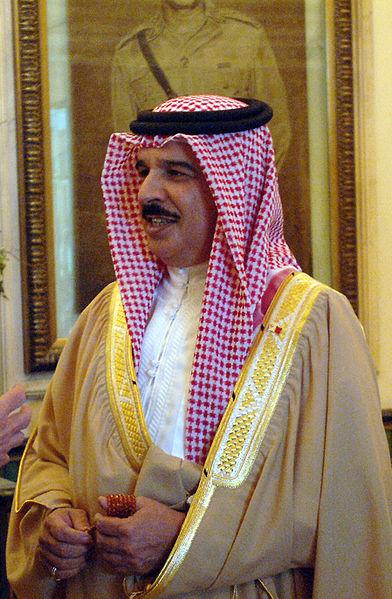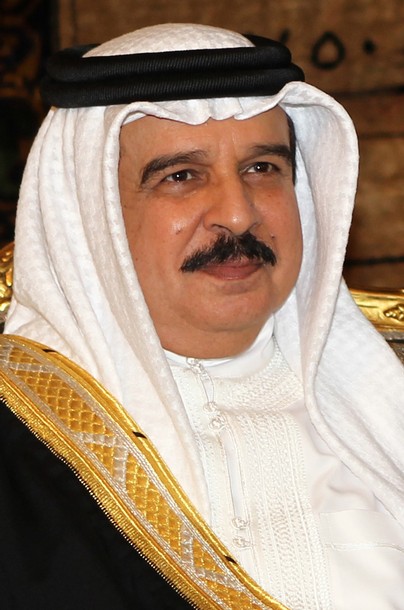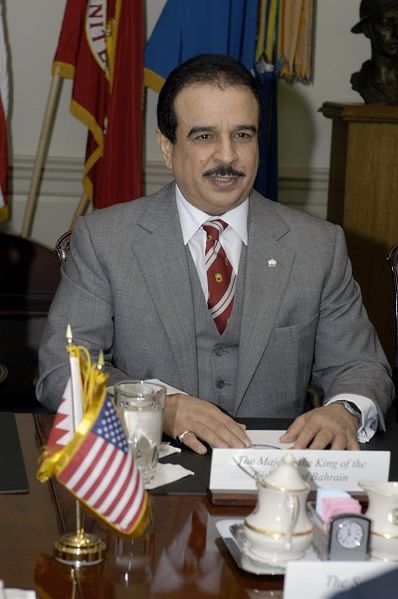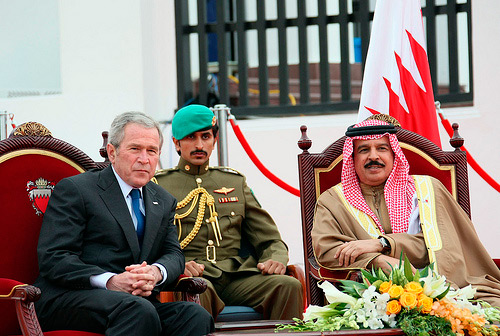<Back to Index>
- King of Bahrain Hamad bin Isa bin Salman Al Khalifa, 1950
PAGE SPONSOR



Hamad bin Isa bin Salman Al Khalifa (Arabic: حمد بن عيسى بن سلمان آل خليفة; born 28 January 1950) is the King of Bahrain (since 14 February 2002), having previously been its Emir (from 6 March 1999). He is the son of Isa bin Salman Al Khalifa, the previous Emir.
Hamad bin Isa Al Khalifa was born on 28 January 1950 in Riffa, Bahrain. His parents were Isa bin Salman Al Khalifa who in 1950 was the Crown Prince and Hessa bint Salman Al Khalifa. After attending Manama Secondary School in Bahrain, Hamad was sent to England to complete the remainder of his education. He attended Applegarth College in Godalming, Surrey, before taking a place at The Leys School in Cambridge. Hamad then underwent military training, first with the British Army at Mons Officer Cadet School at Aldershot in Hampshire, graduating in September 1968. Four years later in June 1972 Hamad attended the United States Army Command and General Staff College at Fort Leavenworth in Kansas, graduating the following June with a degree in leadership.
King Hamad was designated as heir apparent by his father on 27 June 1964. In 1968 King Hamad was appointed as the Chairman of the Irrigation Council and Manama Municipal Council. He was commissioned into the Bahrain National Guard on 16 February 1968 and appointed as its commander the same year, remaining in that post until 1969 when he was appointed as the Commander - in - Chief of the Bahrain Defence Force. In 1970 King Hamad became the head of the Bahraini Department of Defense and the Vice Chairman of the Administrative Council, remaining in both offices until 1971. From 1971 to 1988 he was the Minister of State for Defense.
In October 1977, King Hamad started learning to fly helicopters, successfully completing the training in January 1978. He then worked to establish the Bahrain Amiri Air Force which came into being in 1987 when the Defence Force air wing was reconstituted as an air force.
On the death of his father Isa bin Salman Al Khalifa, Hamad became Emir of Bahrain on 6 March 1999.
As Emir, Hamad brought several political reforms to Bahrain. These
included the release of all political prisoners, the dissolution of the
State Security Court and the abolition of the 1974 Decree on State Security Measures. Additionally, many Bahraini citizens were permitted to return after several years in exile overseas. In 2002 he declared himself king.
After HM King Hamad took power in 1999, he focused on attaining stability in a nation riddled with profound tensions after the 1990s uprising. The King succeeded in improving the living standards and in making Bahrain a financial hub. During the period 2003 - 2010 the majority Shi'ite community and Secular Sunnis accused his government of corruption, discrimination in housing and jobs, recruiting foreigners in military service and bringing Sunni tribes from Asia to change the demographic composition of the nation. This led to some minor disturbances by the Shia'a community against His Majesty's Government.
During HM King Hamad current years of reign, the Shi'ite majority community took some positions in the government, but they called for improving the entire political system and equitable distribution of positions and jobs. The Al Khalifa family led a large number of ministerial and Governmental posts including the Ministry of Interior, Ministry of Justice, Ministry of Finance, Ministry of Culture, Ministry of foreign affairs, general organizations for youth and sport, the Bahrain Economic development board and the Supreme council for women. Also, positions of power in Bahrain Defense Force were filled with Sunnis, a minority that made around 30% of the population. The Information affairs authority had been separated from the Ministry of information and led by a member of Al Khalifa family too. The Opposition claimed that this is a nepotism which marginalized people. HM King Hamad stated that he is giving an equal chance to all Bahrain people regardless their sect.
In October 2010, HM's Government accused 24 Bahraini citizens mostly Shi'ite Muslim in forming a terrorist cell linked to Iran and trained in Syria
for overthrowing the regime and planning for terrorist attacks.
Opposition Parties denounced the accusations and described it as
propaganda. After just a few weeks, tensions raised again after
a controversial Bahraini parliamentary election, when the main Opposition bloc Al Wefaq National Islamic Society with Secularist National Democratic Action Society
(Waad) accused the government of an unfair election system that aims to
reduce the number of Shiite’s and Secularists seats in parliament,
although the first party won nearly 40% of the available seats, and the
United States regarded the elections as free and fair.
On 14 February 2011, the tenth anniversary of a referendum in favor of the National Action Charter, and the ninth anniversary of the Constitution of 2002, Bahrain was rocked by protests inspired by the Arab spring and coordinated by a Facebook page named "Day of Rage in Bahrain", a page that was liked by tens of thousands just one week after its creation. The Bahrain government responded with what has been described as a "brutal" crackdown on the protests, including violations of human rights that caused anger. Later on, demonstrators demanded Hamad to step down. As a result of this "massive" crackdown, the Foreign Policy classified him as rank 3 out of 8 of "America's Unsavory Allies" calling him "one of the bad guys the U.S. still supports".
On 11 February, King Hamad ibn Isa Al Khalifa ordered that 1,000 Bahraini dinars (approximately US$ 2,667) be given to "each family" to celebrate the tenth anniversary of the National Action Charter referendum. Agence France - Presse linked the BD 1,000 payments to the 14 February demonstration plans.
On 15 February 2011, king Hamad apologized for the deaths of two demonstrators on a rare TV speech and urged investigating the incident after four protestors were killed and hundreds wounded when protestors were attacked in Pearl Square at 3:00 A.M local time. Pearl Square was evacuated and encircled by the Bahraini army. One day later, HM King Hamad ordered the withdrawal of army troops from there after mediation of the Crown price after the killing of a fifth protestor by live ammunition next to Pearl square. Later on, HM King Hamad showed restraint while demonstrations against him continued for several weeks.
During the peak of the 2011 – 2012 Bahraini uprising on the mid of March 2011 HM King Hamad declared three months State of emergency just after he called Peninsula Shield Force troops to enter Bahrain. Saudi Arabia deployed about 1,000 troops with armored support, and the United Arab Emirates deployed about 500 police officers. Opposition parties reacted strongly, calling it an "occupation". But HM King Hamad stated that he deployed the troops to protect infrastructure and to secure key installations. After this step taken by HM King Hamad, the Bahrain economy suffered losses estimated at billions. Also, the security situation deteriorated in areas that people were demonstrating against him. While dozens of deaths were announced including five who died in custody due to torture.
On 1 June 2011, protests erupted across Shia dominated areas of Bahrain to demand HM King Hamad to step down and to end martial law as HM King Hamad announced that state of emergency was officially lifted.
In June 2011 King Hamad commissioned the Bahrain Independent Commission of Inquiry headed by respected human rights lawyer M. Cherif Bassiouni to look into the events surrounding the unrest. The establishment of the BICI was praised by Barack Obama and the international community as a step towards establishing responsibility and accountability for the events of the 2011 - 2012 Bahraini uprising. The BICI reported its findings in November 2011 and US Secretary of State Hillary Clinton “commend[ed] King Hamad bin Isa al-Khalifa’s initiative in commissioning it”.
King Hamad was invited to the royal wedding of Prince William of Wales and Kate Middleton.
He declined amidst protests by human rights activists who had pledged
to disrupt his stay in Britain because of his violent response to
demonstrators. Earlier in 2005, he was the only sovereign head of state
to attend the wedding of Charles, Prince of Wales, and Camilla Parker
Bowles.
